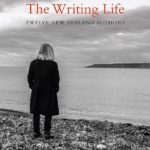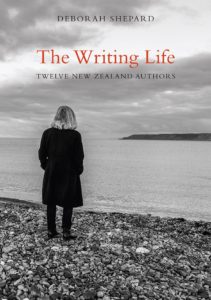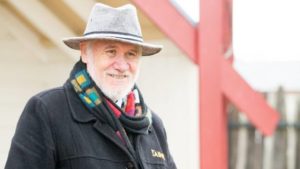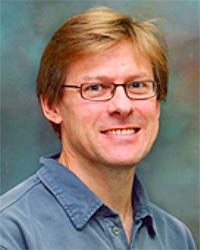NOHANZ Biennial Conference 15-17 November 2024
« » Sun Mon Tue Wed Thu Fri Sat October October October October 1 2 3 4 5 6 7 8 9 10 11 12 13 14 15- ‘The Writing Life: Oral history into book the stories of twelve New Zealand authors’

If you intend to attend and haven’t already done so, please don’t forget to RSVP to the launch of The Writing Life – we would love for you to join us to celebrate this event.
‘The Writing Life: Oral history into book the stories of twelve New Zealand authors’
Date: Thursday, 15 November, 2018
Time: 6:00pm to 7:00pm
Cost: Free. You don’t need to book.
Location: Te Ahumairangi (ground floor), National Library, corner Molesworth and Aitken Streets, Thorndon
Contact Details: events.natlib@dia.govt.nz
Join Deborah Shepard to hear her account of the genesis of the book The Writing Life.
The book began with an oral history project for the New Zealand Society of Authors, that was funded by an Award in Oral History in 2015. The history project was to record the stories of senior members of the New Zealand literary community:
Joy Cowley
Marilyn Duckworth
Tessa Duder
Chris Else
Patricia Grace
David Hill
Witi Ihimaera
Fiona Kidman
Owen Marshall
Vincent O’Sullivan
Philip Temple, and
Albert Wendt.
Deborah will outline the process from oral history into book and the surprises and discoveries she made along the way about the challenges and pleasures of the writing vocation from 12 of our most experienced and brilliant practitioners.
 

Cover of The Writing Life: Twelve New Zealand Authors by Deborah Shepard.
16 17 18 19 20 21 22 23 24 25 26 27- 27-29 November 2018 NOHANZ BIENNIAL CONFERENCE 2018 “Te Waha Kairongorongo e”: The Voice in Time and Space

27-29 November, Te Whare Wānanga o Waikato NOHANZ Biennial Conference 2018
This year the theme of our conference focuses on the sweet sound of the voice, the singers of tales (te waha kairongorongo), storytellers, and the resonance of the voice through time and space. How is oral history transient through time and space? How do the voices of our participants travel through, or resonate in, time and space as a vehicle for memory? What significance do we find in the spaces we use to access, listen to, co-create, and present voices that give meaning and memory to the past? How is the notion of “time” apparent in the transmission of memory across generations of voices?
‘E WAHA KAIRONGORONGO E’: THE VOICE IN TIME AND SPACE
NATIONAL ORAL HISTORY ASSOCIATION OF NEW ZEALAND BIENNIAL CONFERENCE
27-29 NOVEMBER 2018
TE WHARE WĀNANGA O WAIKATO/ Waikato University
KIRIKIRIROA/HAMILTON
ACCOMMODATION
· University student hostel https://www.ivvy.com.au/event/O6ECMT/
· Other accommodation https://www.hamiltonwaikato.com/accommodation/
Funding support https://natlib.govt.nz/about-us/scholarships-and-awards/jack-ilott-fund
Keynote Speakers & Workshops
Associate Professor Tom Roa (Ngāti Maniapoto, Te Whare Wānanga o Waikato)
Raised in the Waipa district, Associate Professor Tom Roa (Ngāti Maniapoto, Te Whare Wānanga o Waikato) is a leader within his iwi Ngāti Maniapoto and is one of the distinctively resonant voices of Purekireki Marae. He is a well-respected kaumatua in Tainui, and his opinion is often highly sought after in regard to Māori politics and knowledge more broadly in Aotearoa. He has dedicated over four decades of his work and life to te reo Māori revitalization, and is a senior member, professor, and mentor, in the Faculty of Māori and Indigenous Studies (FMIS) at the Te Whare Wānanga o Waikato. His PhD thesis focuses on the idea of the “translator as cultural mediator” and examined the naming of living things in the Linnaeus classification system of Western science — and how this idea of naming from a Māori perspective acknowledges the mauri and mana motuahake of flora and fauna. Associate Professor Roa is also a member of the Waitangi Tribunal and an expert in Māori oral history.
KEYNOTE: “‘Me aro ki te hā …’: Oral History and the Power of Women’s Words in Waipa”
For Māori, oral history is often contested, nuanced, and complex. We pass on oral stories as part of our tradition and practice, and they remain valid narratives of our collective, personal, and interwoven histories which affect our notions of wairua, of ‘spirit’. This keynote talk draws on some of the oral histories I grew up with, and are specifically local and connected to the land, people, and places, of Waipā. They reveal how women’s stories or “her-stories” have sometimes been marginalized and silenced in favour of dominant male narratives, and how oral histories, even in Māori worlds, are not innocent scripts that occur naturally but are powerfully constructed and contested acts of memory-making that have purpose in the present. They are grounded in a ‘wairua’ whose metaphors are lessons from the past for today, into the future. Drawing on these korero tuku iho I will talk broadly about the way Māori make sense of oral history, the practice, form, and nature, of how our oral histories are passed on as valid and important accounts of our shared pasts.
WORKSHOP: “Māori Oral Histories”/ Trip to Orakau (Co-delivered with Dr Nēpia Mahuika, Ngāti Porou)
Māori oral history is inextricably connected to land, whakapapa, mātauranga, korero tuku iho, and reo. Māori oral history is whanau and iwi driven. This Workshop takes us to the Orakau. Where we discuss the way Māori oral history is embedded in land, filled with emotion, narrated in complex kōrero tuku-iho, waiata, and collective memory. The facilitators discuss the form, politics, ethics, and nature of oral history for those who are committed to using the sources as oral history.
Professor Alistair Thomson (Monash University)
 Alistair Thomson is Professor of History at Monash University, where he loves teaching courses on world history, Australian history, environmental history, oral history and public history. His oral history books include: Anzac Memories: Living with the Legend (1994 and 2013), The Oral History Reader (1998, 2006 and 2015 with Rob Perks), Ten Pound Poms: Australia’s Invisible Migrants (2005, with Jim Hammerton), Moving Stories: an intimate history of four women across two countries (2011) Oral History and Photography (2011, with Alexander Freund) and Australian Lives: An Intimate History (2017, with Anisa Puri).
Alistair Thomson is Professor of History at Monash University, where he loves teaching courses on world history, Australian history, environmental history, oral history and public history. His oral history books include: Anzac Memories: Living with the Legend (1994 and 2013), The Oral History Reader (1998, 2006 and 2015 with Rob Perks), Ten Pound Poms: Australia’s Invisible Migrants (2005, with Jim Hammerton), Moving Stories: an intimate history of four women across two countries (2011) Oral History and Photography (2011, with Alexander Freund) and Australian Lives: An Intimate History (2017, with Anisa Puri).
KEYNOTE: Australian Lives, A Digital Aural History Experiment
Australian Lives: An Intimate History, published in May 2017, features 50 life story interviews with Australians born between 1920 and 1989 recorded by the Australian Generations Oral History Project to illustrate what everyday life has been like in Australia over the past century. This publication, also published as an e-book, highlights change and continuity over time by featuring a diverse range of narrators who reflect on their experiences as children and teenagers, in midlife and in old age, about faith, migration, work and play, activism, memory, and identity.
In this presentation I’ll outline the collaboration between university historians, the National Library of Australia and ABC Radio National that generated 300 Australian Generations life history interviews and a range of radio programs and written publications, and introduce the decisions, processes and technologies that underpinned the project. I’ll then outline how we created Australian Lives and focus on the particular opportunities and challenges presented by the e-book format. I’ll examine how the e-book functions as a curated entry point to the archive, how it challenges traditional expectations of what it means to be an author and a reader, and how the format offers readers editorial transparency. I explore the ethical, methodological and technical challenges Anisa and I faced as we created the book, and what we learnt about editing oral history for both readers and listeners.
In conclusion I’ll reflect on how users have responded to the e-book’s distinctive approach. Do users tend to read extracts, listen to them, or both? How does listening enrich the experience of ‘reading’ oral history? How are users reconciling the fundamentally different experiences of reading and listening? How successful is the e-book format as a tool to connect an audience to an oral history archive?
WORKSHOP: “Interpreting Memories”
How do we make sense of the memories that we record as oral historians? How do we begin to transform stories into histories? In this workshop we’ll consider a range of ways of approaching the interpretation of memories. We’ll note the changing ways that researchers have used memory as a historical source. We’ll consider the factors that shape memory stories. We’ll try out narrative analysis with interview extracts (from Al’s interviews with migrants and war veterans) using the rich clues of sound, gesture, word and narrative form. We’ll think about how we might work with a set of interviews to find historical patterns and illuminate historical themes. You’ll finish up brimming with ideas and enthusiasm for working with your own interviews (or other people’s interviews), armed with lists of further reading if you wish to deepen your understanding
- NOHANZ Biennial General Meeting 2018
Notice of Biennial General Meeting 2018
Members are warmly invited to the 2018 NOHANZ Biennial General Meeting to be held at :
- Te Whare Wananga o Waikato
- 5pm, for 5.30pm to 7pm meeting on Tuesday 27 November 2018
Read: Notice of meeting, Notice of Motion to change to Annual General Meeting, Minutes 2016, Administrator Role, and Representative Voting Form
Programme
5pm Light drinks and nibbles
5.30 to 7pm Biennial General Meeting
Biennial General Meeting – Agenda
1 Apologies
2 Minutes of BGM 21 October 2016
3 Matters Arising from 21 October 2016 Minutes
4 President’s Report
5 Treasurer’s Report and Financial Statements for 2016 and 2017
6 Discussion of 3 Matters for Changes to Constitution
- Change to Annual rather than Biennial General Meeting for approval of Financial Statements.
- Number on Executive Committee.
2016 BGM Minutes records “Proposal that the Executive Committee number be increased. Topic to be voted on at next BGM.”
Constitution states “The Committee shall consist of a President, Secretary, Treasurer, the immediate Past-President and three other members.”
- Paid book-keeper role.
7 Election of Officers
New members are welcomed, to enable the Committee to represent a range of interests, skills and regions. Meetings at held quarterly, online by internet conference. If you are a paid up member of NOHANZ and interested in standing, or want more information please contact NOHANZ at nohanzexec@gmail.com
Nominations from the floor are welcome, with use of the Nomination form.
For NOHANZ members unable to attend the BGM, but wishing to participate in the elections and voting, the Representative Voting Form should be completed and either emailed to nohanzexec@gmail.com or given to the scrutineer on the day of the General Meeting.
Supporting documents
To support your participation in the BGM the following documents will be available in November on the NOHANZ website http://www.oralhistory.org.nz/
Minutes of Biennial General Meeting 2016
Nomination for a Position on the Executive Committee
NOHANZ – Committee Roles
Representative Voting Form
We look forward to seeing you there.
Sue Monk
Secretary
National Oral History Association of New Zealand
October 2018
28- 28 November 2018 Public Lecture Professor Freund
PUBLIC LECTURE
Professor Alexander Freund
University of Winnipeg
Wednesday 28 November 2018 at 5.30 pm
Te Ahumairangi Programme Room, Main Foyer
National Library of New Zealand, Molesworth Street, Wellington
My People’s Crimes: On the Difficulty of Talking About and Acknowledging One’s Nation’s Atrocities
Postwar West Germans invented a word to describe the difficulty they had with talking about and acknowledging the atrocities they or their parents had committed during the Second World War: Vergangenheitsbewältigung—the attempt to cope with, work through, and overcome a difficult past. This process of Vergangenheitsbewältigung is not unique to Germany; in the wake of de-colonization, civil wars, conflicts after the break-up of the Soviet Union, and genocides throughout the twentieth and early twenty-first centuries, many nations have gone through various kinds of Vergangenheitsbewältigung.
In this presentation, I argue, from an autobiographical perspective, that it is not enough to load Vergangenheitsbewältigung off on to institutions such as Truth and Reconciliation Commissions; instead, individuals, families, and societies need to learn how to talk about and acknowledge one’s nation’s past crimes. I am drawing on my own experiences of growing up in West Germany and of immigrating to Canada, thus witnessing from a private citizen’s eye how individuals and families in two different societies have attempted “to put the events of the past behind us”. My personal experiences were deeply shaped by my oral history interviews with immigrants and refugees in Canada, which eventually led me, together with my colleague Nolan Reilly, to found an oral history centre at my university. I will conclude with some thoughts on the role of oral history in individuals’, families’, and societies’ attempts to talk about and acknowledge their nation’s past atrocities.
Professor Alexander Freund
Alexander Freund is a Professor of History at the University of Winnipeg, where he holds the Chair in German-Canadian Studies and serves as the Director of the Oral History Centre. Recent publications include: History, Memory, and Generations: German-Canadian Experiences in the Twentieth Century (forthcoming); The Canadian Oral History Reader (2015, edited with Kristina Llewellyn and Nolan Reilly); and Oral History and Ethnic History (2014).
29 30 December
Sun | Mon | Tue | Wed | Thu | Fri | Sat |
|---|---|---|---|---|---|---|
October | October | October | October | 1 | 2 | 3 |
4 | 5 | 6 | 7 | 8 | 9 | 10 |
11 | 12 | 13 | 14 | 15
| 16 | 17 |
18 | 19 | 20 | 21 | 22 | 23 | 24 |
25 | 26 | 27
| 28
| 29 | 30 | December |
